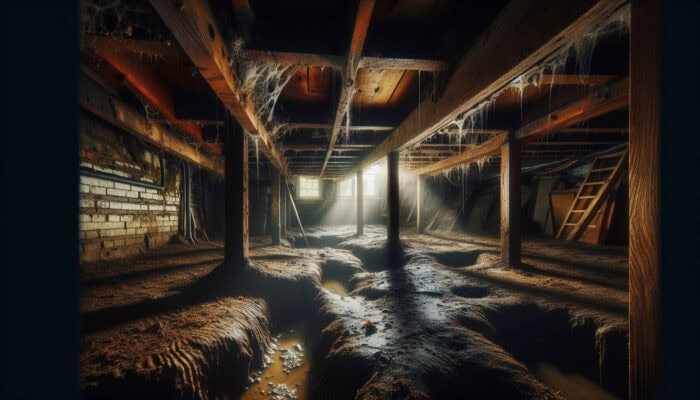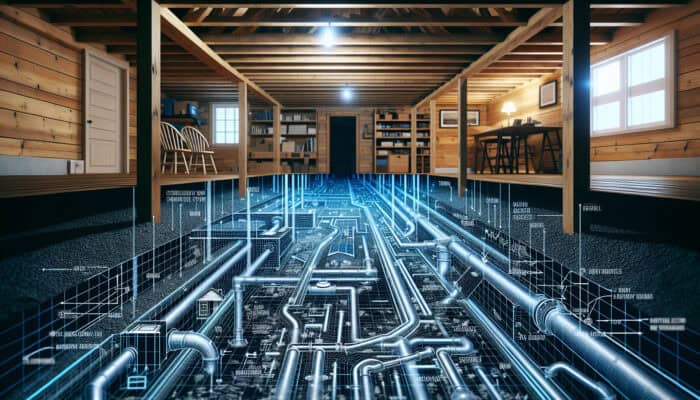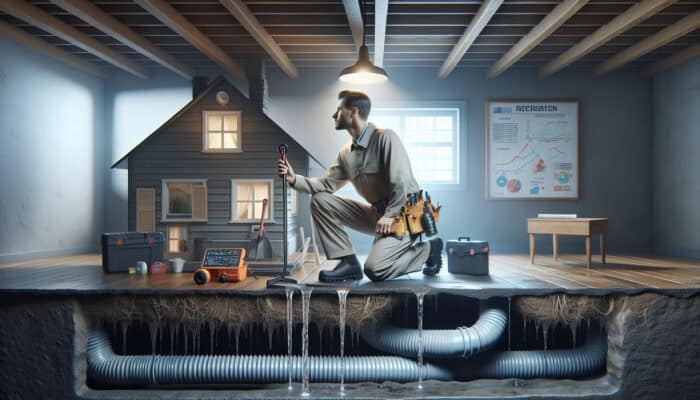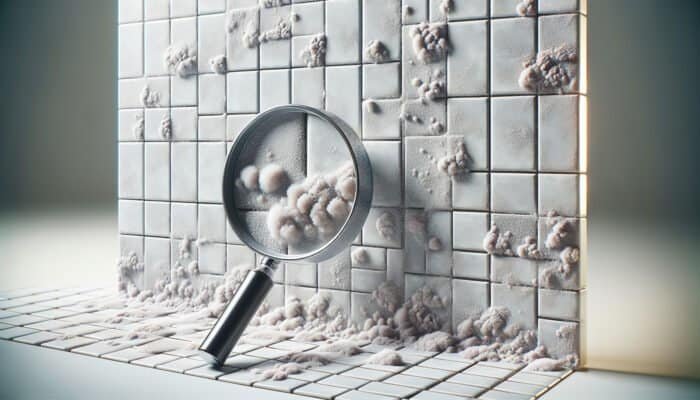Identify and Address Crawl Space Drainage Requirements to Safeguard Your Home
Understanding Common Crawl Space Challenges and Their Implications

Crawl Space Drainage Services in Port Coquitlam: The presence of crawl spaces in homes can lead to a range of issues that may threaten both safety and structural integrity. A critical concern is moisture accumulation, which can trigger serious complications like mold growth, structural deterioration, and pest infestations. Residents of Port Coquitlam should be particularly vigilant about these dangers due to the area’s climate, which often results in heightened moisture levels. Below are some of the common issues frequently encountered in crawl spaces:
- Moisture buildup
- Mold and mildew growth
- Structural damage to support beams and joists
- Pest infestations, including rodents and insects
- Odours and indoor air quality concerns
- Wood rot and decay
- Soil erosion around the foundation
- Foundation cracks and shifting
It is crucial to take swift action to tackle these issues to avoid costly repairs and maintain your home’s value. Regular inspections coupled with proactive maintenance are essential in effectively mitigating these risks and ensuring the longevity of your property.
The Importance of Establishing an Effective Drainage System for Home Protection
Creating a dependable drainage system is vital for any home, especially in regions like Port Coquitlam, where heavy rainfall can lead to significant water accumulation. A robust drainage system effectively acts as a barrier against water infiltration into crawl spaces, thereby safeguarding the structural integrity of your foundation and enhancing the overall safety of your home. The primary advantages of implementing a reliable drainage system include:
- Preventing moisture accumulation
- Minimising the risk of mold and mildew
- Enhancing home value through improved structural integrity
- Boosting indoor air quality
- Protecting against pest infestations
- Extending the lifespan of your home’s foundation
- Reducing the likelihood of expensive repairs
- Improving the comfort and livability of your home
Investing in a high-quality drainage system is essential not only for comfort but is a critical measure in protecting your property from potential water damage and ensuring long-term sustainability.
Steps to Thoroughly Evaluate Your Crawl Space Condition
Conducting regular assessments of your crawl space is indispensable for identifying potential issues before they escalate into significant problems. Ideally, these inspections should occur at least once a year or following significant weather events. Here’s a comprehensive guide for evaluating the condition of your crawl space:
1. Visual Inspection: Start by examining the crawl space entry for indications of water damage, mold, or pest activity. Look for puddles, stains, and unusual odours that may indicate trouble.
2. Moisture Check: Use moisture meters to accurately measure humidity levels, aiming to keep readings below 60%.
3. Insulation Inspection: Assess insulation for any signs of dampness or mold. Damaged insulation should be promptly replaced to avert further complications.
4. Foundation Examination: Inspect the foundation walls and floor for cracks. While minor cracks may be manageable, larger ones should prompt professional evaluation.
5. Ventilation Assessment: Ensure that vents are clear and functioning correctly; effective ventilation is essential for moisture control.
6. Drainage System Review: Inspect existing drainage mechanisms, such as Sump Pumps or French drains, to confirm they are operating effectively.
Routine assessments can help maintain a healthy crawl space and prevent future issues, ensuring your home remains safe and structurally sound.
Professional Insights into Crawl Space Drainage Services in Port Coquitlam

Understanding the Qualifications of Crawl Space Drainage Experts
Professionals who specialise in crawl space drainage possess extensive experience and specialised knowledge essential for effectively addressing drainage challenges. They are well-acquainted with the unique environmental conditions prevalent in Port Coquitlam and can provide tailored solutions that meet your home’s specific needs. Many experts have dealt with residences facing chronic moisture issues and can implement systems designed specifically for high-humidity environments. Examples of expert interventions include:
– Installing advanced sump pump systems that efficiently remove excess water.
– Designing tailored drainage solutions incorporating French drains that expertly redirect water away from the foundation.
– Implementing waterproofing strategies using vapour barriers that effectively seal out humidity from the crawl space, protecting your home.
Choosing a qualified expert can significantly enhance the durability and effectiveness of your crawl space drainage system, ensuring it performs optimally over time.
How Professionals Diagnose Crawl Space Drainage Problems
Experts employ a range of advanced tools and methodologies to accurately diagnose crawl space drainage issues. Their diagnostic process typically involves a comprehensive examination of both visible and hidden problems. Here’s a step-by-step overview of their diagnostic approach:
1. Initial Consultation: Experts generally commence with discussions regarding any noticeable issues you’ve encountered, such as unpleasant odours or visible moisture.
2. Comprehensive Inspection: This includes checking for visible cracks, mold, and assessing the condition of existing drainage systems.
3. Moisture Measurement: Using specialised equipment, experts measure humidity levels within your crawl space, identifying areas with excessive moisture.
4. Soil Testing: In certain cases, testing the soil surrounding the foundation can provide insights into drainage problems, particularly if the soil is improperly graded.
5. Ventilation Evaluation: Experts will inspect the ventilation system to ensure it effectively circulates air, a crucial factor in moisture control.
Understanding these diagnostic methods empowers homeowners to appreciate the importance of hiring professionals for crawl space assessments, ensuring effective solutions are implemented.
Choosing the Right Expert for Your Crawl Space Drainage Services

Selecting the right professional for crawl space drainage services is crucial for ensuring quality workmanship and peace of mind. When evaluating potential service providers, consider the following criteria:
- Years of experience in crawl space drainage
- Positive customer reviews and testimonials
- Relevant certifications and licenses
- Knowledge of local building codes and regulations
- Detailed quotes with clear pricing transparency
- Warranty offerings for services provided
- Comprehensive service options, including ongoing maintenance
- Technology and tools utilised in installations
A qualified expert will not only resolve your current drainage challenges but will also offer valuable insights and preventive measures for the future, ensuring your investment is well-protected.
Recommended Crawl Space Drainage Solutions from Professionals
Experts frequently recommend several effective strategies to address crawl space drainage issues. These solutions are designed to minimise water accumulation and protect your home from moisture damage. Commonly advised options include:
– Sump Pumps: These devices are essential for removing excess water from crawl spaces, particularly in low-lying areas vulnerable to flooding.
– French Drains: Installed around the foundation’s perimeter, these drains efficiently redirect water away from the crawl space.
– Vapour Barriers: These barriers prevent moisture from infiltrating the crawl space, significantly lowering humidity levels and inhibiting mold growth.
– Gravel Drainage Systems: These systems facilitate the redirection of surface water and improve drainage around your foundation.
– Downspout Extensions: Properly directing rainwater away from the foundation keeps the crawl space dry and minimises water intrusion.
Real-world case studies reveal that implementing these solutions can significantly enhance the health of your crawl space and prevent costly damage, ultimately safeguarding your property.
Key Components and Installation Process of Crawl Space Drainage Systems
Essential Components of an Effective Crawl Space Drainage System
A comprehensive crawl space drainage system comprises numerous critical components that play vital roles in effective moisture management. Understanding these elements empowers homeowners to make informed decisions regarding their drainage solutions. Key components include:
- Sump Pumps
- French Drains
- Vapor Barriers
- Drains and Piping
- Gravel and aggregate materials
- Drainage Mats
- Foundation Walls
- Downspout Extensions
Each component works in unison to form a cohesive system that prevents water accumulation. For instance, sump pumps work alongside French drains to effectively expel water, while vapour barriers serve to block humidity infiltration, ensuring the integrity of your crawl space.
Understanding the Drainage System Installation Process
Installing a crawl space drainage system is a complex procedure that requires professional expertise to ensure maximum effectiveness. The primary steps typically followed during the installation process include:
1. Site Assessment: Professionals evaluate the crawl space and surrounding area to determine the most suitable drainage solutions tailored to your specific needs.
2. Crawl Space Preparation: This involves clearing debris, inspecting for structural issues, and ensuring the area is accessible for the installation team.
3. Drainage Component Installation: French drains, sump pumps, and other components are installed following best practices to ensure optimal functionality.
4. Sealing and Waterproofing: Vapour barriers are installed to effectively cut off moisture sources, preventing dampness from entering the crawl space.
5. Testing the System: After installation, the entire system is tested to verify it meets performance standards and operates as intended.
Each of these steps is crucial in ensuring a successful installation and protecting your home from potential water damage, preserving its value.
Maintenance Strategies for Crawl Space Drainage Systems
Proper maintenance of your crawl space drainage system is vital for its longevity and effectiveness. Here are some straightforward tips to ensure your system remains in excellent condition:
1. Regular Inspections: Conduct inspections every six months to verify that all components are functioning correctly, and check for visible signs of moisture.
2. Clean Drainage Systems: Regularly clear any debris from drains to prevent blockages that could lead to water accumulation.
3. Test Sump Pumps: Periodically check sump pumps by pouring water into the pit to confirm they activate as expected and function correctly.
4. Monitor Humidity Levels: Use a hygrometer to keep track of indoor humidity levels, targeting a range of 30-50% to inhibit mold growth.
5. Inspect Seals and Barriers: Regularly check vapour barriers and seals for signs of wear or damage, replacing them when necessary.
By adhering to these maintenance strategies, homeowners can ensure that their crawl space drainage systems remain effective, preventing potential problems down the line and ensuring peace of mind.
Benefits of Engaging Professional Crawl Space Drainage Services
The Advantages of Hiring Professionals for Drainage Solutions
Engaging professionals for crawl space drainage services offers numerous benefits that can significantly enhance your drainage solutions. Professionals possess the required expertise to navigate the complexities of drainage systems, ensuring compliance with local regulations while delivering high-quality workmanship. Key benefits include:
- Expert assessment of crawl space conditions
- Installation of high-quality drainage solutions
- Compliance with local building codes
- Warranty on services provided
- Access to specialised tools and technology
- Long-term savings through effective solutions
- Expert advice and recommendations for ongoing maintenance
- Peace of mind knowing the job is done right
Investing in professional services ultimately leads to a more reliable drainage system, providing long-lasting protection for your home and enhancing your overall quality of life.
How Proper Drainage Solutions Can Boost Your Home’s Value
A well-maintained crawl space drainage system can significantly elevate your home’s market value. Prospective buyers often hesitate to invest in properties with a history of moisture-related issues or drainage complications. Effective drainage not only preserves the structural integrity of the home but also enhances its overall appeal. The advantages of proper drainage concerning home value include:
– Increased Buyer Confidence: A home equipped with a robust drainage system reassures buyers regarding its condition.
– Lower Insurance Premiums: Properties with effective moisture control may qualify for reduced insurance rates due to less risk.
– Enhanced Curb Appeal: Proper drainage minimises erosion and water pooling, maintaining the aesthetics of your property.
– Longevity of the Home: Properly managed drainage prolongs the life of the home’s foundation and structure, making it more attractive to prospective buyers.
Overall, homeowners who invest in effective drainage solutions not only protect their homes but also potentially boost their resale value, ensuring a worthwhile investment.
How Drainage Services Mitigate Health Risks
Effective crawl space drainage services play a vital role in safeguarding your family’s health. Inadequate drainage can lead to mold and mildew growth, which pose significant health risks, especially for individuals with respiratory conditions. The benefits of professional drainage services include:
– Reduction of Mold Growth: Properly managed drainage prevents conditions conducive to mold growth, thereby protecting your family from related health risks.
– Improved Indoor Air Quality: An efficient drainage system lowers humidity levels, contributing to better air quality throughout the home.
– Minimised Allergens: Effective drainage reduces the presence of allergens like dust mites and mold spores, promoting a healthier living environment.
– Peace of Mind: Knowing your home is protected against moisture-related health hazards instills a sense of security and well-being.
By investing in professional drainage services, you actively contribute to creating a healthier living space for you and your loved ones, making it a vital consideration for any homeowner.
Preventing Structural Damage Through Effective Drainage Solutions
Proper drainage is essential in preventing water accumulation that can compromise your home’s foundation and overall structure. Over time, accumulated moisture can lead to severe issues such as foundation cracks, shifting, and wood rot, jeopardising your home’s safety. Effective drainage protects your property by:
– Preventing Soil Erosion: Well-designed drainage systems channel water away from the foundation, minimising soil erosion and reducing settling risks.
– Mitigating Water Accumulation: Sump pumps and French drains work together to eliminate excess water, preventing it from pooling around the foundation.
– Extending the Life of Your Foundation: By effectively managing water levels, homeowners can prolong the lifespan of their foundation and reduce the frequency of costly repairs.
– Enhancing Structural Integrity: Keeping the crawl space dry ensures that structural components remain intact, preventing sagging and warping over time.
Effective drainage not only preserves your home’s structural integrity but also saves you from the financial burden of extensive repairs, making it an essential aspect of responsible homeownership.
Best Practices for Crawl Space Drainage Services in Port Coquitlam
Implementing Best Practices for Drainage System Installation
Adopting best practices during drainage system installation is crucial to ensuring long-lasting and effective solutions. Professionals should adhere to industry standards to guarantee the quality of their work. Best practices encompass:
- Conducting thorough assessments prior to installation
- Utilising high-quality materials that can withstand local environmental conditions
- Following local building codes and regulations
- Ensuring adequate slope and grading around the foundation
- Incorporating maintenance access points for future inspections
- Installing backup systems, such as battery-operated sump pumps
- Employing proper sealing and waterproofing techniques
- Documenting the installation process for future reference
Adhering to these best practices not only enhances the drainage system’s effectiveness but also extends its lifespan, ensuring that your investment pays off over time.
Strategies for Optimising Your Drainage System Performance
Optimising your drainage system can significantly extend its lifespan and improve its overall effectiveness. Homeowners can implement various strategies to enhance performance, including:
1. Regular Maintenance: Conduct routine inspections and cleanings to ensure that all components function properly and are free from blockages.
2. Upgrade Components: Consider upgrading to higher-efficiency sump pumps or drainage materials that outperform standard options.
3. Monitor Water Flow: Regularly check that water is flowing unobstructed through drains and away from the foundation.
4. Adjust Grading: Ensure that the grading around your home effectively directs water away from the foundation, reducing the risk of accumulation.
5. Implement Landscaping Solutions: Utilise landscaping techniques, such as rain gardens or swales, to further manage runoff and drainage around your home.
By taking these proactive steps, homeowners can ensure their drainage systems continue to function effectively over time, minimising the risk of future issues and maintaining a safe living environment.
Ensuring Long-Term Effectiveness of Your Drainage System
To maintain the long-term effectiveness of your crawl space drainage system, adopting a proactive maintenance strategy is crucial. Here are several expert recommendations for keeping your drainage system functional:
1. Scheduled Inspections: Set a schedule for regular inspections, ideally every six months, to catch early signs of problems before they escalate.
2. Prompt Repairs: Address issues immediately, whether it involves replacing a malfunctioning sump pump or clearing a blocked drain.
3. Document Performance: Maintain records of inspections and maintenance to track performance and identify patterns indicating underlying issues.
4. Educate Yourself: Stay informed about the latest technologies and methods in crawl space drainage, which can provide insights for potential upgrades.
5. Engage Professionals: Consult with drainage experts periodically to ensure your systems remain optimised and compliant with current standards.
These strategies will help maintain the efficiency of your drainage system, ensuring it continues to provide effective protection for your home.
Common Challenges in Crawl Space Drainage Installation
Installing crawl space drainage systems can present various challenges, and understanding these obstacles can help homeowners prepare for potential issues. Common challenges faced during drainage installation include:
– Access Limitations: Tight or confined crawl spaces can complicate installation, necessitating specialised tools and techniques to navigate.
– Soil Conditions: Heavy clay or rocky soil can hinder excavation and installation processes, occasionally requiring additional equipment.
– Water Table Variability: Seasonal fluctuations in water tables can influence drainage requirements and affect installation strategies.
– Existing Structures: Pre-existing structures or utilities within the crawl space may need to be navigated or accommodated during installation.
– Climate Factors: Weather conditions can delay installation timelines, especially in areas prone to heavy rainfall or snow.
By recognising these challenges, homeowners can collaborate with professionals to devise effective solutions and ensure successful installations that meet their needs.
Selecting the Right Drainage Service Provider in Port Coquitlam
Choosing a dependable drainage service provider is essential for successful installation and ongoing maintenance. When selecting a drainage service in Port Coquitlam, consider the following criteria:
- Years of experience in crawl space drainage services
- Customer reviews and case studies showcasing successful projects
- Licensing and insurance coverage
- Transparency in pricing, including estimates and warranties
- Technologies and techniques utilised during installation
- Post-installation support and maintenance offerings
- Approach to environmental considerations and sustainability
- Availability for consultations and follow-up services
Evaluating these factors will help homeowners select a drainage provider that meets their specific needs, ensuring quality work and peace of mind throughout the process.
Understanding Financial Aspects of Crawl Space Drainage Installation
Factors Influencing the Cost of Drainage Installation
The cost associated with installing a crawl space drainage system can vary significantly based on several factors. Understanding these variables can assist homeowners in budgeting more effectively. Key factors influencing drainage costs include:
- Size of the crawl space
- Complexity of the required drainage system
- Type and quality of materials used
- Local labour rates and availability of professionals
- Accessibility of the crawl space
- Existing drainage issues that may necessitate additional work
- Permitting and inspection costs
- Geographical considerations, such as soil type and climate conditions
By considering these factors, homeowners can gain a clearer understanding of the overall costs associated with installing a new drainage system, allowing for better financial planning.
Effective Budgeting for Professional Drainage Services
Creating an effective budget for professional drainage services involves careful planning and consideration of various factors. Here’s how to financially prepare for drainage projects:
1. Get Multiple Quotes: Obtain estimates from several drainage service providers to gauge market rates and the scope of services.
2. Factor in Contingencies: Set aside a contingency fund of around 10-20% of your total budget for unforeseen complications or additional repairs.
3. Prioritise Needs vs. Wants: Identify essential services and materials versus optional upgrades or additional features that may enhance the system.
4. Consider Financing Options: Explore financing avenues, such as home improvement loans or payment plans, to ease the financial burden.
5. Monitor Ongoing Costs: Account for future maintenance expenses to ensure sustained effectiveness and avoid larger repairs in the future.
By following these budgeting strategies, homeowners can approach their drainage projects with confidence and clarity, ensuring successful outcomes.
Affordable Drainage Solutions for Homeowners
There are several cost-effective drainage solutions available that balance budget constraints with the need for quality outcomes. Exploring these options can help homeowners achieve effective drainage without overspending. Some affordable drainage solutions include:
– DIY Drainage Improvements: Simple actions like grading the landscape or clearing existing drains can dramatically enhance drainage at minimal cost.
– Basic Sump Pumps: Investing in a reliable, entry-level sump pump can facilitate essential water removal without a hefty financial commitment.
– French Drains: These can be installed at a relatively low cost, particularly when integrated with existing drainage systems to improve performance.
– Regular Maintenance: Committing to routine maintenance can prevent larger problems and costs in the future, ensuring the system remains effective.
By considering these affordable solutions, homeowners can make informed investments in their drainage systems while staying within budgetary limits.
Recognising the Signs Indicating the Need for Crawl Space Drainage
Identifying Moisture and Mould Problems in Your Crawl Space
Early identification of moisture and mould issues is crucial for effective intervention and prevention. Here are some telltale signs that may indicate drainage problems in your crawl space:
- Visible mold growth on surfaces
- Musty odours emanating from the crawl space
- Condensation forming on pipes or walls
- Dark stains or discoloration on wooden beams
- Peeling paint or wallpaper within the home
- Elevated humidity levels measured with a hygrometer
- Frequent water stains on foundation walls
- Presence of pests such as termites or rodents
If you observe any of these indicators, it is essential to promptly assess the situation and consider seeking professional assistance for a comprehensive evaluation and remediation.
Recognising Indicators of Structural Damage in Your Home
Structural damage can arise due to inadequate drainage, leading to severe consequences for your home. Recognising early signs of these issues can make a significant difference. Common indicators of structural damage include:
– Visible Cracks: Hairline cracks in walls or ceilings may signify foundation shifting due to water damage.
– Sagging Floors: Uneven or sagging floors can indicate compromised support structures, potentially resulting from moisture issues.
– Bulging Walls: Walls that appear to bulge or bow outward often indicate excessive moisture or pressure from water buildup.
– Doors and Windows Sticking: Difficulty in opening or closing doors and windows may suggest shifting frames caused by foundation movement.
– Separation of Trim: Gaps between trim and walls or ceilings can signify structural instability and require immediate attention.
Identifying these structural damage indicators early can save homeowners from costly repairs and ensure the safety of their living environment.
When to Seek Professional Help for Drainage Issues
Knowing when to reach out to professionals for drainage issues can prevent minor problems from escalating into major concerns. Homeowners should seek professional help when:
1. Signs of Moisture Persist: If moisture or mould is present despite initial attempts to address the issue.
2. Structural Damage is Apparent: Visible signs of structural damage necessitate immediate professional assessment to avert hazards.
3. Drainage Systems Fail: If existing systems, such as sump pumps or drains, are not functioning effectively and require repair or replacement.
4. Frequent Water Accumulation Occurs: Regular pooling of water in or around the crawl space requires professional evaluation and intervention to prevent further complications.
5. Health Concerns Arise: Any health issues related to air quality or mould exposure should prompt immediate action from professionals.
Timely intervention from experts can safeguard your home and family from the adverse effects of inadequate drainage, ensuring a safe and healthy living environment.
Assessing DIY vs. Professional Crawl Space Drainage Solutions
Can Homeowners Successfully Install Drainage Systems Independently?
While DIY projects can be appealing, installing drainage systems is generally best left to professionals due to the complexities involved. However, understanding the feasibility of self-installation can help homeowners evaluate their options. Risks associated with DIY drainage installation include:
1. Lack of Expertise: Without specialised knowledge, homeowners may overlook critical factors that could influence system performance and effectiveness.
2. Improper Installation: Mistakes during installation can lead to inadequate drainage, resulting in costly repairs down the line.
3. Compliance Issues: DIY installations may fail to adhere to local building codes, potentially leading to legal and safety concerns.
4. Limited Tools: Professionals have access to specialised tools and equipment that may not be readily available to the average homeowner, hindering effective installation.
While enthusiastic DIYers can manage minor drainage improvements, significant installations require professional expertise to ensure safety and compliance.
Advantages of Professional Installation for Drainage Systems
Opting for professional installation of your crawl space drainage system offers numerous advantages that can enhance overall effectiveness. Professionals bring valuable expertise and resources to the project, including:
- Higher quality materials and products
- Precision in installation techniques to ensure durability
- Knowledge of local building codes to guarantee compliance
- Efficient troubleshooting and problem-solving abilities
- Warranty coverage and service guarantees for peace of mind
- Access to advanced diagnostic technology for accurate assessments
- Long-term cost savings through preventive measures and proper installation
- Comprehensive post-installation support and maintenance offerings
By choosing professional installation, homeowners can ensure a reliable and efficient drainage system that effectively protects their property in the long run, providing invaluable peace of mind.
Identifying Situations Where DIY Is Sufficient for Drainage Tasks
In specific situations, homeowners may find that DIY solutions are adequate for certain drainage challenges. Recognising when it’s safe to tackle drainage tasks independently allows for effective action. Scenarios where DIY may be sufficient include:
1. Simple Grading Adjustments: Modifying the landscape around the home to promote drainage can usually be accomplished without professional assistance.
2. Clearing Existing Drains: Simple tasks like removing debris or leaves from visible drains can enhance drainage without requiring specialised skills.
3. Insulation Replacements: Replacing damaged insulation in a crawl space can often be achieved by homeowners with basic DIY knowledge.
4. Basic Sump Pump Maintenance: Performing routine checks and maintenance on existing sump pumps may be feasible for those with some technical understanding and experience.
Recognising these scenarios empowers homeowners to take ownership of minor tasks while leaving more complex installations and repairs to the experts.
Future Innovations in Crawl Space Drainage Solutions
Emerging Trends in Drainage Technology
The field of drainage technology is continuously evolving, with innovations aimed at enhancing efficiency and effectiveness. Homeowners should stay informed about emerging technologies that could benefit their drainage systems. Key innovations on the horizon include:
– Smart Sump Pumps: These advanced pumps utilise IoT technology to monitor water levels and alert homeowners of potential issues via smartphone notifications, enhancing responsiveness.
– Advanced Waterproofing Materials: New materials designed to improve waterproofing capabilities are being developed for better moisture management, offering enhanced protection.
– Integrated Drainage Systems: Systems that combine multiple drainage solutions into a cohesive design are emerging, offering improved performance and efficiency.
– Eco-Friendly Solutions: Innovations focused on sustainable practices, such as rainwater harvesting systems, are becoming more accessible to homeowners, promoting environmentally friendly drainage options.
By staying abreast of these trends, homeowners can make informed decisions regarding their drainage systems and optimise their investments for the future.
Impact of Climate Change on Drainage Requirements
Climate change is expected to have significant implications for drainage requirements, particularly in areas like Port Coquitlam, where weather patterns are continuously evolving. Key potential impacts include:
– Increased Rainfall: More frequent and intense rainfall events can overwhelm existing drainage systems, necessitating upgrades and enhancements to protect properties.
– Rising Water Tables: Changes in groundwater levels may require homeowners to reassess drainage strategies and implement more robust solutions to manage increased water levels.
– Flood Risks: As flood risks heighten, homeowners may need to invest in more comprehensive drainage solutions to safeguard their properties from potential flooding.
Understanding these potential changes can help homeowners prepare for future drainage challenges and adapt their systems accordingly for resilience.
Proactive Steps Homeowners Can Take to Prepare for Future Drainage Challenges
Proactive measures can assist homeowners in staying ahead of drainage issues arising from climate change or other factors. Here are steps to prepare for future drainage challenges:
1. Upgrade Existing Systems: Regularly assess and upgrade older systems to ensure they meet changing conditions and increased demands for efficient drainage.
2. Invest in Smart Technologies: Consider incorporating smart drainage solutions that provide real-time monitoring and alerts for potential issues, enhancing responsiveness.
3. Educate Yourself: Stay informed about local environmental changes and drainage trends to make informed decisions about your home’s drainage needs.
4. Create an Emergency Plan: Develop a strategy for flooding or heavy rains that outlines actionable steps to protect your property and minimise damage.
5. Engage with Professionals: Consult with drainage experts to ensure your systems are equipped to handle future challenges, providing peace of mind.
Taking these proactive steps can significantly strengthen your home’s resilience against potential drainage problems, ensuring long-term safety and stability.
Frequently Asked Questions About Crawl Space Drainage
How often should I inspect my crawl space for drainage issues?
It is advisable to inspect your crawl space at least once a year or after significant weather events to identify potential issues early and address them promptly.
What are the indicators of poor drainage in my crawl space?
Indicators include visible moisture, mold growth, musty odours, and structural damage such as cracks in walls or sagging floors that require immediate attention.
What is the average cost of installing a crawl space drainage system?
Costs can vary based on factors like size, complexity, and materials, but homeowners should generally budget several thousand dollars on average for installation.
Can I install a drainage system myself?
While some minor improvements can be accomplished through DIY methods, significant installations are best left to professionals due to their complexity and potential risks involved.
What advantages does a sump pump provide?
A sump pump effectively removes excess water from crawl spaces, preventing moisture buildup and protecting your home from water-related damage over time.
How can I maintain my drainage system effectively?
Regular inspections, debris removal, sump pump testing, and humidity level monitoring are key steps for ensuring the ongoing effectiveness of your drainage system.
Are eco-friendly drainage solutions available?
Yes, options like rainwater harvesting systems and permeable paving can help manage drainage sustainably while minimising environmental impact.
What should I do if I discover mould in my crawl space?
If mould is present, it is crucial to address the moisture issue immediately and consider hiring professionals to assess and remediate the mould effectively.
How does inadequate drainage affect my home’s market value?
Poor drainage can significantly reduce your home’s value by increasing the risk of structural damage and moisture-related health risks, making it essential to address.
What is a vapour barrier, and is it necessary?
A vapour barrier is a material designed to prevent moisture from entering the crawl space. It is generally recommended for homes in humid climates to guard against mould formation and maintain structural integrity.
Connect with us on Facebook!
Presented By: Crawl Space Drainage in Port Coquitlam
The Article: Crawl Space Drainage Services in Port Coquitlam: Your Solution First Published On: https://pacificbluemechanical.ca/
The Article Crawl Space Drainage Services: Solutions in Port Coquitlam Was Found On https://limitsofstrategy.com



